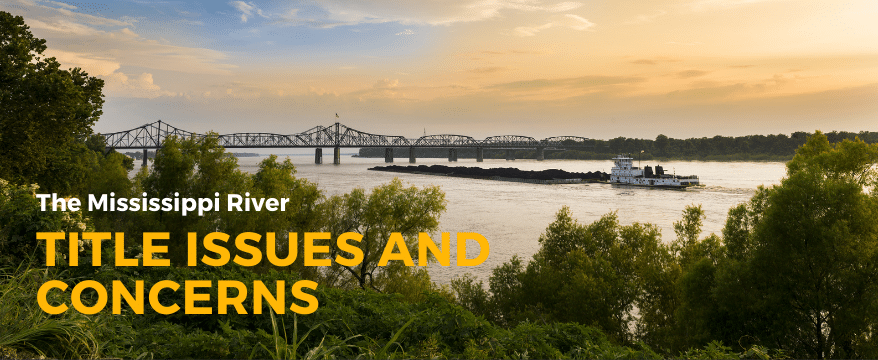The Mississippi River: Title Issues and Concerns

Mississippi may not have as much waterfront property as some of our neighboring southern states, but I am still asked on occasion about any special riparian or water rights exceptions for property impacted by some body of water. A non-coastal agent may be working on their first transaction involving a lake house or maybe even a commercial property abutting a river and, in the process, become concerned about any new types of title issues that they have yet to encounter. For the most part, these issues can be dealt with by simply using a riparian/water rights exception tailored to the specific property and accepted by your underwriter. In some instances, that exception may be a “one-liner” but it may also contain a few short paragraphs covering everything from surface easements to rights of differing levels of government. This changes when we are working with property abutting or even surrounding the namesake for our state: The Mississippi River. Real property transactions along the Mississippi River present various unique title issues in relation to other waterfront property.
First, we must consider the bed line and any changes that have occurred. Whereas the title to the bed line of other rivers in Mississippi may be more easily discernable, the Mississippi River may require a search back to the land patent to determine who truly owns the bed line. The “Great River” has also changed course during the time that the property surrounding it has been conveyed by land patent, which can raise issues to ownership. There were islands that are no longer islands and areas that were dry land but are now part of the river. With many parts of the western boundary of the State of Mississippi being established by the Mississippi River, there has been litigation between the State of Louisiana and the State of Mississippi as to ownership and where the state boundary is located. Louisiana has argued with a certain level of success that the Bayou State has rights to certain lands, islands, and accretions of the Mississippi River due to reservations made in its statehood documents that preceded those of Mississippi. The Mississippi has changed in various ways due to infamous flooding, human infrastructure, and intervention in the flow of the water. The resulting erosion, accretions and changes in the bed line of the Mississippi River can result in title issues if not adequately excepted to in the policy.
Second, we must consider the rights of various individuals and government bodies. In addition to the usual riparian rights exception for navigational servitudes and public or private rights to use the waters, there are also concerns as to more unique rights. Federal, state, and local governments may have rights regarding the control, alteration, and use of piers, bulkheads, or levees along the river. We must consider the United States government and its regulation of levees and flood control projects through the Mississippi River Commission. The federal government has also held onto rights to certain islands for military purposes. These rights may not be easily discovered in your typical title search but the land may be subject to those statutory and regulatory rights affecting not only the river itself, but also the banks extending to the high-water level line. In these situations, a well-crafted exception will cover these issues.
Finally, there are many undeveloped or rural areas along the river in which the real property has been family-owned for several decades. As we all know, old family property often means older record legal descriptions that are difficult to draw or include vague references to natural markers that may no longer exist. Such legal descriptions create title issues in and of themselves, but when describing property along the Mississippi River it can be quite the headache from a title perspective. In most cases, a new survey can provide a legal description that could solve most issues. An exception to the ambiguity of the legal description may also be acceptable to your underwriter. What about in circumstances in which an old legal description makes vague references to islands and is being used to assert ownership of said islands or possibly accretions formed by the Mississippi River? It is not uncommon to see such legal descriptions attempt to describe lands that have not yet been formed by the river in the form of accretions. As previously stated above, there may be a claim to such accretions and islands by others. Insuring such property would gain you a quick call from your underwriter.
While Ol’ Man River is a beautiful sight to see when crossing into our state, it can provide unique issues to those of us in the title industry. Between disputes regarding the changes in the bed line, rights of individuals and governments, and ambiguous, over-reaching legal descriptions, the flow of the Mississippi River can impact the flow of your closing process. As always, contact your underwriter to determine your “best course” when dealing with any of the aforementioned issues.

